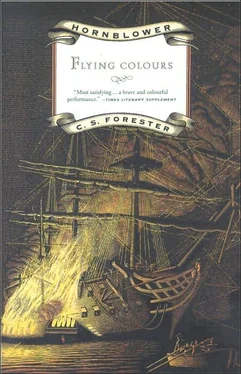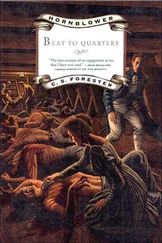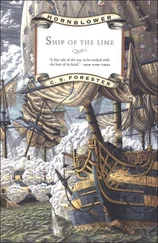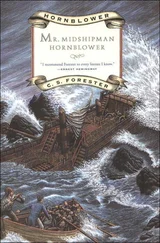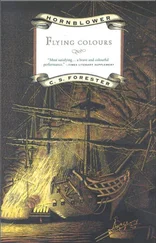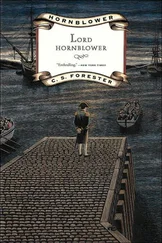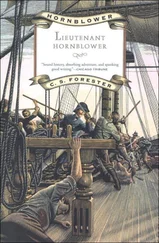Cecil Forester - Flying Colours
Здесь есть возможность читать онлайн «Cecil Forester - Flying Colours» весь текст электронной книги совершенно бесплатно (целиком полную версию без сокращений). В некоторых случаях можно слушать аудио, скачать через торрент в формате fb2 и присутствует краткое содержание. Год выпуска: 1989, ISBN: 1989, Издательство: Back Bay Books, Жанр: Исторические приключения, Путешествия и география, Морские приключения, на английском языке. Описание произведения, (предисловие) а так же отзывы посетителей доступны на портале библиотеки ЛибКат.
- Название:Flying Colours
- Автор:
- Издательство:Back Bay Books
- Жанр:
- Год:1989
- ISBN:0316289396
- Рейтинг книги:5 / 5. Голосов: 1
-
Избранное:Добавить в избранное
- Отзывы:
-
Ваша оценка:
- 100
- 1
- 2
- 3
- 4
- 5
Flying Colours: краткое содержание, описание и аннотация
Предлагаем к чтению аннотацию, описание, краткое содержание или предисловие (зависит от того, что написал сам автор книги «Flying Colours»). Если вы не нашли необходимую информацию о книге — напишите в комментариях, мы постараемся отыскать её.
Flying Colours — читать онлайн бесплатно полную книгу (весь текст) целиком
Ниже представлен текст книги, разбитый по страницам. Система сохранения места последней прочитанной страницы, позволяет с удобством читать онлайн бесплатно книгу «Flying Colours», без необходимости каждый раз заново искать на чём Вы остановились. Поставьте закладку, и сможете в любой момент перейти на страницу, на которой закончили чтение.
Интервал:
Закладка:
Once more the misery of imprisonment was borne in upon him. He grew sick with longing for his liberty, for his freedom, for Barbara and for Maria.
Chapter Three
Hornblower was walking next day upon the ramparts again; the sentries with their loaded muskets stood one each end of the sector allotted to him, and the subaltern allotted to guard him sat discreetly against the parapet so as not to break in upon the thoughts which preoccupied him. But he was too tired to think much now—all day and nearly all night yesterday he had paced his room, three paces up and three paces back, with his mind in a turmoil. Exhaustion was saving him now, he could think no more.
He welcomed as a distraction a bustle at the main gate, the turning out of the guard, the opening of the gate, and the jingling entrance of a coach drawn by six fine horses. He stood and watched the proceedings with all the interest of a captive. There was an escort of fifty mounted men in the cocked hats and blue-and-red uniforms of Bonaparte’s gendarmerie, coachmen and servants on the box, an officer dismounting hurriedly to open the door. Clearly the new arrival must be a man of importance. Hornblower experienced a faint feeling of disappointment when there climbed out of the coach not a Marshal with plumes and feathers, but just another officer of gendarmerie. A youngish man with a bullet black head, which he revealed as he held his cocked hat in his hand while stooping to descend; the star of the Legion of Honour on his breast; high black boots with spurs. Hornblower wondered idly why a colonel of gendarmerie who was obviously not crippled should arrive in a coach instead of on horseback. He watched him go clinking across the courtyard to the Governor’s headquarters.
Hornblower’s walk was nearly finished when one of the young French aides-de-camp of the Governor approached him on the ramparts and saluted.
“His Excellency sends you his compliments, sir, and he would be glad if you could spare him a few minutes of your time as soon as it is convenient to you.”
Addressed to a prisoner, as Hornblower told himself bitterly, these words might as well have been ‘Come at once.’
“I will come now, with the greatest of pleasure,” said Hornblower, maintaining the solemn farce.
Down in the Governor’s office the colonel of gendarmerie was standing conversing alone with His Excellency; the Governor’s expression was sad.
“I have the honour of presenting to you, Captain,” he said, turning, “Colonel Jean-Baptiste Caillard, Grand Eagle of the Legion of Honour, and one of His Imperial Majesty’s personal aides-de-camp. Colonel, this is Captain Horatio Hornblower, of His Britannic Majesty’s Navy.”
The Governor was dearly worried and upset. His hands were fluttering and he stammered a little as he spoke, and he made a pitiful muddle of his attempt on the aspirates of Hornblower’s name. Hornblower bowed, but as the colonel remained unbending he stiffened to attention. He could recognize that type of man at once—the servant of a tyrant, and in close personal association with him, modelling his conduct not on the tyrant’s, but on what he fancied should be the correct behaviour of a tyrant, far out-Heroding Herod in arbitrariness and cruelty. It might be merely a pose—the man might be a kind husband and the loving father of a family—but it was a pose which might have unpleasant results for anyone in his power. His victims would suffer in his attempt to prove, to himself as well as to others, that he could be more stern, more unrelenting—and therefore naturally more able—than the man who employed him.
Caillard ran a cold eye over Hornblower’s appearance. “What is he doing with that sword at his side?” he asked of the Governor.
“The admiral returned it to him on the day of the battle,” explained the Governor hastily. “He said—”
“It doesn’t matter what he said,” interrupted Caillard. “No criminal as guilty as he can be allowed a weapon. And a sword is the emblem of a gentleman of honour, which he most decidedly is not. Take off that sword, sir.”
Hornblower stood appalled, hardly believing he had understood. Caillard’s face wore a fixed mirthless smile which showed white teeth, below the black moustache which lay like a gash across his olive face.
“Take off that sword,” repeated Caillard, and then, as Hornblower made no movement, “If Your Excellency will permit me to call in one of my gendarmes, I will have the sword removed.”
At the threat Hornblower unbuckled his belt and allowed the weapon to fall to the ground; the clatter rang loud in the silence. The sword of honour which the Patriotic Fund had awarded him ten years ago for his heading of the boarding party which took the Castilla lay on the floor, jerked half out of its scabbard. The hiltless tang and the battered places on the sheath where the gold had been torn off bore mute witness to the lust for gold of the Empire’s servants.
“Good!” said Caillard. “Now will Your Excellency have the goodness to warn this man of his approaching departure?”
“Colonel Caillard,” said the Governor, “has come to take you and your first lieutenant, Mistaire—Mistaire Bush, to Paris.”
“Bush?” blazed out Hornblower, moved as not even the loss of his sword could move him. “Bush? That is impossible. Lieutenant Bush is seriously wounded. It might easily be fatal to take him on a long journey at present.”
“The journey will be fatal to him in any case,” said Caillard, still with the mirthless smile and the gleam of white teeth.
The Governor wrung his hands.
“You cannot say that, Colonel. These gentlemen have still to be tried. The Military Commission has yet to give its verdict.”
“These gentlemen, as you call them, Your Excellency, stand condemned out of their own mouths.”
Hornblower remembered that he had made no attempt to deny, while the admiral was questioning him and preparing his report, that he had been in command of the Sutherland the day she wore French colours and her landing party stormed the battery at Llanza. He had known the ruse to be legitimate enough, but he had not reckoned on a French emperor determined upon convincing European opinion of the perfidy of England and cunning enough to know that a couple of resounding executions might well be considered evidence of guilt.
“The colonel,” said the Governor to Hornblower, “has brought his coach. You may rely upon it that Mistaire Bush will have every possible comfort. Please tell me which of your men you would like to accompany you as your servant. And if there is anything which I can provide which will make the journey more comfortable, I will do so with the greatest pleasure.”
Hornblower debated internally the question of the servant. Polwheal, who had served him for years, was among the wounded in the casemate. Nor, he fancied, would he have selected him in any case; Polwheal was not the man for an emergency—and it was just possible that there might be an emergency. Latude had escaped from the Bastille. Was not there a faint chance that he might escape from Vincennes? Hornblower thought of Brown’s bulging muscles and cheerful devotion.
“I would like to take my coxswain, Brown, if you please,” he said.
“Certainly. I will send for him and have your present servant pack your things with him. And with regard to your needs for the journey?”
“I need nothing,” said Hornblower. At the same time as he spoke he cursed himself for his pride. If he were ever to save himself and Bush from the firing party in the ditch at Vincennes he would need gold.
“Oh, I cannot allow you to say that,” protested the Governor. “There may be some few comforts you would like to buy when you are in France. Besides, you cannot deprive me of the pleasure of being of assistance to a brave man. Please do me the favour of accepting my purse. I beg you to, sir.”
Читать дальшеИнтервал:
Закладка:
Похожие книги на «Flying Colours»
Представляем Вашему вниманию похожие книги на «Flying Colours» списком для выбора. Мы отобрали схожую по названию и смыслу литературу в надежде предоставить читателям больше вариантов отыскать новые, интересные, ещё непрочитанные произведения.
Обсуждение, отзывы о книге «Flying Colours» и просто собственные мнения читателей. Оставьте ваши комментарии, напишите, что Вы думаете о произведении, его смысле или главных героях. Укажите что конкретно понравилось, а что нет, и почему Вы так считаете.
